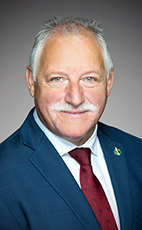Madam Speaker, it gives me great pleasure as the member of Parliament for Sackville—Preston—Chezzetcook to speak today to this important bill, Bill C-238, a national strategy for sound disposal of lamps containing mercury.
I would like to speak about the leadership of my colleague from Dartmouth—Cole Harbour. This bill is a continuation of his hard work at the municipal level.
At the municipal level, environmentally sustainable protection of the environment was a key item and objective of his. It is pretty impressive because I was told as a new member that maybe only 20% of private members' bills made it through. My colleague from Dartmouth—Cole Harbour had unanimous consent in the House, and that is an indication of the hard work and consultation that he has done.
In listening to the audio of the committee, again, it was very obvious that members of all parties across the House and in the committee were eager to have the bill move forward on its merit because of the environmentally safe disposal.
The amendments coming back to the House under the guidance of the sponsor, the member for Dartmouth—Cole Harbour, would allow for all parties, governments, and stakeholders to sit together, talk about this issue, and find solutions, which is crucial. I would like to read a quote from my colleague for Dartmouth—Cole Harbour:
We need to include our partners in other levels of government to ensure that they, along with the federal government, take ownership of this initiative. This will be a strong collaborative effort that will include any interested indigenous groups, governments, stakeholders, or citizens to ensure the strategy is best for all Canadians.
I could not be more in agreement with my colleague from Dartmouth—Cole Harbour.
The contents of the bill are crucial. The bill speaks to Canadians wanting to reduce their energy use and their costs. Therefore, they need to find an environmentally friendly alternative. This compact fluorescent light bulb would do that. The savings are great, and it is a very positive step. However, Canadians need to know that the light bulbs contain mercury, the effect that mercury will have, and ways of recycling it. That is extremely crucial for the bill.
It was noted also by the ministry that four provinces had mandatory programs to collect these light bulbs: B.C., Manitoba, Quebec, and Prince Edward Island. Nova Scotia Power has put in place a program to take back the light bulbs. These are extremely positive steps.
We must also note the importance, environmentally, for the economy. For the green tech economy, this is another step forward. I am so proud to see my colleague from Dartmouth—Cole Harbour, who was inspired by visiting a local business that was disposing and recycling the lamps in a very sustainable and environmentally safe way. It is impressive that the MP took the example of that situation after visiting a company and moving it through steps. The first step, of course, was to the municipal government. The member did what he could in the municipality to ensure that all municipal fluorescent light bulbs would be recycled. That is a very positive step at the municipal level. His initiative would allow the federal government, the provinces, and stakeholders to work together to find solutions for a national strategy.
This is a green environmental initiative that is very well supported by the federal government and by all parties in committee.
As the Prime Minister has said on many occasions and as the Minister of Environment and Climate Change has repeatedly said, the economy and the environment go hand in hand. This legislation is a good example of that.
It is extremely important for people to realize that we have to fix the mercury problem and that there are many ways to do so.
In the past, people did not really know what was causing the problem. They put these things in garbage dumps and trash cans. The problem is that it ended up in the air or the soil.
Incineration was another option. The whole thing can be burned to produce energy. The trouble is that it causes a lot of air quality problems.
The best approach, what we would like to see happen, is recycling, which ensures that the substance does not cause any problems in the air or the soil, and that is essential.
We need leadership on many fronts: businesses, municipalities, the provinces, and the federal government.
My colleagues may not know this, but in 2011, Statistics Canada found that 50% of people were unaware of the problems caused by mercury.
They also did not have access. Therefore, if people do not know the danger or they do not know where they can have these things recycled and if that is not accessible, they probably will not do what is best for our environment and our country.
The bill is extremely important. It proposes a national strategy, which will shine a light, make people more aware, and ideally dispose of these things in a way that is totally environmentally safe.
The second thing I want to note is the importance of collaboration among all parties, as indicated in the bill, as well as indigenous groups and all stakeholders that are concerned and want this to move forward.
We have to be careful. This is an add-on. It builds on programs already in place. It is not a duplication. That is what is extremely important about the bill. This is an opportunity to do what is right, an opportunity for the safe management of these lights to the end of their life, without compromising the environment.
It has been a great pleasure for me to speak to the bill. I congratulate the member for Dartmouth—Cole Harbour for his hard work. I also congratulate the committee members for all of their hard work. I will be supporting the bill.

